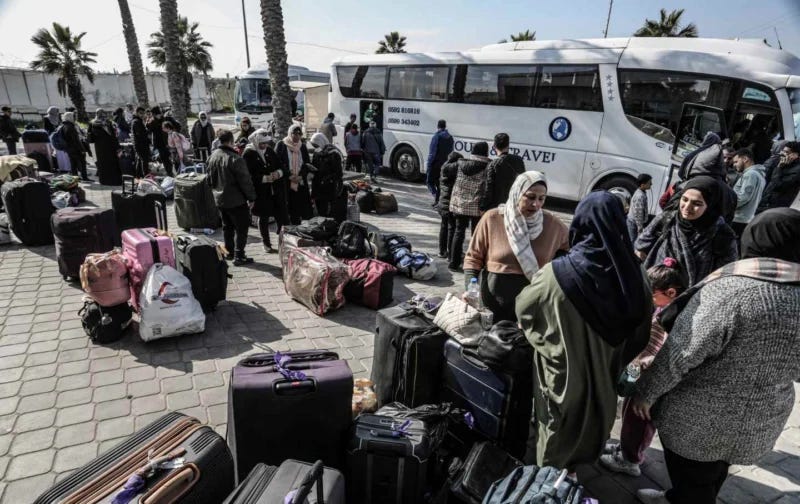🗣️ Let’s Talk—What Are You Seeing?
📩 Reply to this email or drop a comment.
🔗 Not subscribed yet? It is only a click away.
Welcome to this week’s update on the disinformation stories across our shared information warfare domain.
Libya reels from viral refugee hoaxes. Poland’s election is under siege by Russia’s “Doppelganger” bots.
In Burkina Faso, digital campaigns turn Captain Traoré into a pan-African hero overnight.
Stay informed. Read on.
Libyan Gov’t Decries Fake News about taking in Palestinian refugees

🗓️Context:
Libya remains politically fractured, with the internationally recognized Government of National Unity (GNU) in Tripoli facing internal unrest, militia violence, and a fragile hold on power.
In May 2025, reports surfaced in NBC News and American Thinker alleging that the Trump administration had discussed relocating up to one million Palestinians from Gaza to Libya, supposedly in exchange for unfreezing Libyan assets.
The Libyan government has a long-standing, public commitment to the Palestinian cause and faces intense domestic opposition to any suggestion of accepting mass resettlement of Palestinians.
📌 What Happened:
A story claiming Libya would accept one million Palestinian refugees circulated widely, originating from U.S. media outlets and amplified by conspiracy theorists.
The Libyan government, led by PM Abdul Hamid al-Dbeibeh, forcefully denied the claim, labelling it “completely fabricated” and “fake news,” and criticized both the sources and local media that repeated the story.
The U.S. Embassy in Tripoli also publicly denied the report, calling it “completely false”.
⚡ The Fallout:
The fake news triggered confusion and concern among Libyans, some of whom already distrust their government and fear further instability.
The government’s strong denial aimed to prevent unrest, as any cooperation with such a plan would be politically explosive and could threaten the GNU’s already shaky grip on power.
Some Libyan media outlets were criticized for spreading the hoax, prompting official calls for reliance on verified government statements.
🔍 The Narrative Behind It:
This episode is a clear case of disinformation: a fabricated story, amplified by marginal and conspiracy-oriented outlets, then picked up by mainstream and social media without verification.
Tactics include exploiting regional anxieties and leveraging the credibility of major news brands to give falsehoods traction.
The likely intent was to stir unrest, undermine the Libyan government’s legitimacy, and distract from the ongoing Gaza crisis by floating an implausible “solution.”
📝Information Effects Statement Assessment:
U.S.-based conspiracy theorists and marginal media outlets are assessed at a high confidence level to have propagated disinformation about Libya accepting one million Palestinian refugees, using fabricated claims and amplification to sow confusion, undermine the Libyan government, and distract from the Gaza crisis.
There is no evidence of Libyan government involvement; the campaign’s effects include public anxiety and increased scrutiny of media reliability. Confidence is high, based on direct denials from Libyan and U.S. officials and the lack of credible supporting evidence.
Sources
Informed Comment: Libyan Gov’t Decries Fake News about Taking 1 mn. Palestinian Refugees: “Committed to the Palestinian Cause”
NBC News: Trump administration working on plan to move 1 million Palestinians to Libya
Libya Observer: Libya denies reports on hosting Palestinian refugees
Russia running “Doppelganger” disinformation campaign to sway Polish election

🗓️Context:
In May 2025, Poland held the first round of its presidential election amid intense polarization, with centrist Rafal Trzaskowski (Civic Coalition) narrowly leading right-wing Karol Nawrocki (PiS-backed) by 31.36% to 29.54%.
Far-right and eurosceptic candidates, notably Sławomir Mentzen (14.81%) and Grzegorz Braun (6.34%), outperformed expectations, signaling rising discontent and vulnerability to divisive narratives.
The tight result and surge in radical votes created a volatile environment, with both major candidates scrambling to attract support from voters on the political fringes ahead of the June 1 runoff.
📌 What Happened:
Ukrainian intelligence reported that Russia ramped up its “Doppelganger” disinformation campaign during this period, exploiting the close race and deep divisions.
Russian-linked actors used fake news sites and bot networks to spread fabricated claims targeting Polish voters—such as calls for EU withdrawal, anti-Ukraine rhetoric, and attacks on the legitimacy of the election process. Over 10,000 inauthentic accounts were detected amplifying these narratives, with minimal takedown by social media platforms.
The campaign specifically targeted the runoff, aiming to sway undecided voters and exacerbate polarization at a moment of heightened vulnerability.
⚡ The Fallout:
The disinformation effort aims to deepen mistrust in the electoral process, inflamed anti-EU and anti-Ukraine sentiment, and further polarized an already divided electorate. Both leading candidates reported disinformation incidents to authorities, while public anxiety and scrutiny of social media platforms intensified.
The campaign’s timing and intensity exploited the election’s unpredictability, raising concerns about the legitimacy of the outcome and the resilience of Polish democracy
🔍 The Narrative Behind It:
The Doppelganger operation exemplifies coordinated disinformation: fabricating credible-looking news, leveraging bot networks, and exploiting emotional, polarizing topics to manipulate public sentiment.
Tactics include impersonating local citizens, amplifying content via fake engagement, and blending fabricated stories with real media links to evade detection.
The campaign’s strategic objectives are to divide society, degrade adversaries (notably pro-EU and pro-Ukraine leaders), and facilitate state propaganda by echoing Kremlin narratives.
📝Information Effects Statement Assessment:
Russian state-linked actors are assessed at a high confidence level to have escalated coordinated disinformation activities targeting the Polish presidential election runoff, using fabricated media and bot amplification to exploit political polarization and electoral vulnerability, with the purpose of undermining trust in democratic institutions, EU cohesion, and support for Ukraine.
The timing and scale of the operation, combined with attribution to previously sanctioned entities and corroborated by multiple intelligence sources, indicate deliberate intent to destabilize Poland during a period of heightened uncertainty.
SOURCES
Alliance4Europe: Illegal Doppelganger Operation: Targeting the Polish Elections
Le Monde: Poland suspects Russian interference in presidential election campaign
Ukraine Defence Intelligence Post regarding recent Doppelganger operations
The digital false glorification of Ibrahim Traoré
🗓️Context:
Since 2022, Captain Ibrahim Traoré’s junta has ruled Burkina Faso, with his image increasingly promoted as a pan-African, anti-Western leader across social media.
Pro-Traoré narratives surged in 2024–2025, amplified by influencers, AI-generated content, and coordinated online networks, including those with links to Russian propaganda operations.
Many viral claims about Traoré’s achievements have been debunked as false or misleading by fact-checkers and independent analysts.
📌 What Happened:
A wave of disinformation glorifying Traoré spread across West African social media, driven by pro-junta influencers, Pan-African activists, and networks with suspected Russian backing.
There is no evidence Traoré himself directly orchestrates these campaigns; instead, the amplification comes from digital content creators, regional influencers, and foreign-linked propaganda networks.
⚡ The Fallout:
The campaign has shaped public perception, boosting Traoré’s legitimacy and popularity at home and abroad, while stifling dissent and normalizing military rule.
It has fuelled anti-Western sentiment, increased support for authoritarian governance, and complicated diplomatic and humanitarian engagement in the region.
🔍 The Narrative Behind It:
This is a coordinated disinformation effort: glorifying the leader, suppressing opposition, and promoting anti-Western, pro-military narratives.
Techniques include astroturfing, influencer amplification, AI deepfakes, and emotional appeals to pan-Africanism.
The main actors are pro-junta social media influencers, Pan-Africanist activists, and foreign-linked propaganda networks—especially Russian-backed operations—using digital tools to manipulate public opinion and legitimize military rule.
📝Information Effects Statement Assessment
Pro-junta influencers, Pan-Africanist activists, and suspected Russian-linked propaganda networks are assessed at a high confidence level to be conducting coordinated disinformation campaigns glorifying Ibrahim Traoré. They are using fabricated content and influencer amplification to legitimize military rule, suppress dissent, and foster anti-Western sentiment.
There is no evidence that Traoré himself directs these efforts; rather, the campaigns serve to entrench his regime’s legitimacy and expand authoritarian influence in the region. Confidence is high, based on consistent open-source monitoring, fact-checking, and attribution to established disinformation actors.






